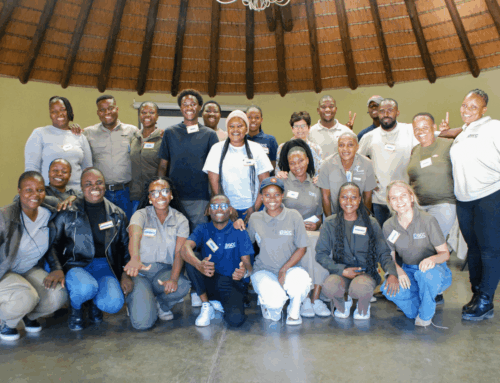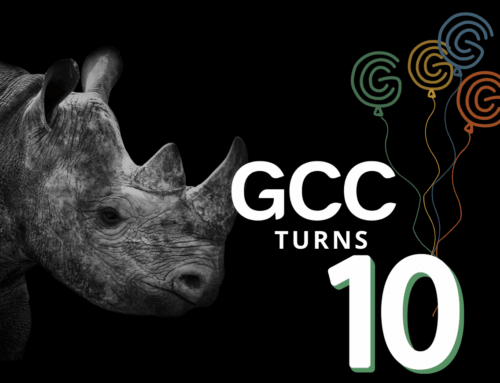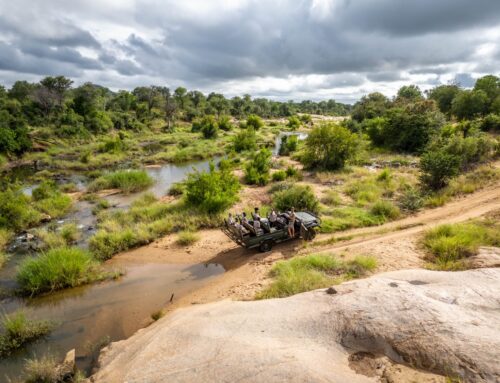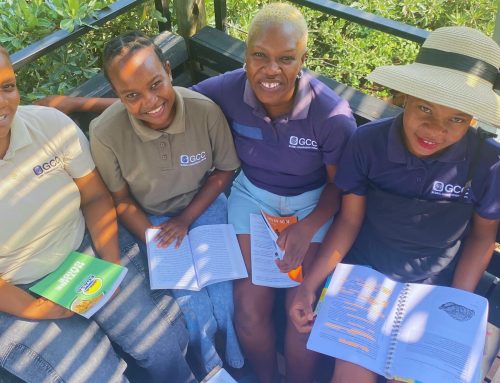Global Conservation Corps (GCC) is proud to announce the arrival of its brand-new podcast, hosted by Bob Ludke, an advisor to GCC and the creator of the Voices of Nature podcast.
The mission of the podcast is dedicated to sharing the voices of young, passionate leaders who are committed to saving and protecting the world’s most threatened natural species.
By creating this podcast GCC not only wants to showcase the amazing work of people who have dedicated their lives to living and working in some of the most challenging places in the world, but also explore solutions that all of us can be part of, in an effort to protect wildlife, and the ecosystems that all of us depend on for healthy, prosperous lives.
In this inaugural podcast, Ludke talks with GCC Founder and Executive Director Matt Lindenberg about why he founded GCC, the people who inspired him, and what it feels like to stumble across a pride of 26 lions in the bush.
Here are some of the highlights of this first conversation You can access the full audio experience here.
Tell us about the Global Conservation Corps and its mission?
GCC was founded in 2015 with the overarching mission of bridging a very large gap between the local communities that border protected areas and the conservation areas that they live next to, or adjacent to.
So, where we work is in South Africa, where I’m talking to you from today, right next to the world-famous Kruger National Park, which is roughly 2.2 million hectares in size. It is roughly the same size as the Netherlands and is one of Africa’s largest protected areas. And on the border of that park, we have around four million people, many of whom are living in substandard conditions and come from very disadvantaged communities and backgrounds. Our mission is to impact these individuals, especially the youth that border these protected areas, and try to change the narrative whereby local populations and communities are the ones benefiting the most from the continued existence of wildlife.
We are delivering results and benefits to the communities with a multi-tiered approach and are focusing on both short- and long-term solutions. So, our short-term solution is focusing heavily on the rangers, the wildlife protectors, that literally are putting their lives at risk every single day to keep endangered species safe from poaching. As you know, we are losing two to three rhinos a day here in South Africa. The rangers are buying us time, but it is not a sustainable solution.
You credit your mentor, Martin, who you met in the dining hall at the Southern African Wildlife College, as the inspiration for GCC. Can you tell us more about him?
I met Martin Mthembu in the cafeteria of the Southern African Wildlife College in about 2009. I was working as a guide at the time. He had a huge presence about him and he had a number of students sitting around him, asking him questions, and I just thought, this is a man I had to meet. So, over the next couple of years, I got to learn a lot more about Martin’s story.
He had a really powerful story of defying the odds and doing something that was sort of unimaginable in his era. He was born in 1968, on the 16th of August in KwaZulu-Natal, which is one of our provinces here in South Africa. And obviously, he was born into an apartheid South Africa, which was, you know, 50 years of white supremacy and basically restricting the freedom, the movement, and the rights of black people. He was the eldest of eight children.
One of the few things Martin could do when he turned 18 was to enlist in the South African military. So being a black man, in an apartheid-ruled South Africa, Martin was sent to the most dangerous locations, because according to the ruling government at the time, his life was worth less than that of a white soldier. Martin also lost his dad at a really young age as well. So, any money he made in the military, he was sending back home.
And throughout his military career, Martin gained really specialized skills. And he spent a lot of time working and training in the African Bush, away from cities and where wildlife existed as well. And that’s really where Martin started to connect with nature. After Martin exited the military – and of course, South Africa got its independence in 1994 – he then brought all of his skills and his training into the conservation sector, training over 15,000 rangers across Africa in his lifetime, through conflict and civil wars.
I was fortunate enough to learn from him in a really big way. We spent countless weeks out in the field together, training rangers, sleeping under the stars, living in the “Big Five” country. He saved my life three times, twice from lions and once from a black mamba.
Can you share one of these stories with us?
It was December 2011 and we were training rangers just outside of the Kruger National Park. We had 16 rangers that had come to us for a six-week program to learn how to operate in the field. For one of the weeks, we took the students out into the field. I remember it was a really hot afternoon, we departed from our camp, probably around three o’clock and we headed into a drainage line where we had just had a huge amount of rain. The grasses were head high, and we were marching in single file up this termite mound. And as we got to the top, we started crawling. I put my head over the termite mound and found ourselves in front of a very famous lion pride, called the Birmingham pride. And at the time, they were 25 strong.
How did you know it was the Birmingham pride?
The Birmingham pride is incredibly famous, and they were the predominant pride in our area. So, what they would do is, in the summer, they would get together as the prey was more prolific. And in the winter, the Birmingham pride would split up. So, it was the majority of the lions in our area that had all sort of come together for the summer season. And now we find ourselves smack bang in the middle of this pride.
We were about 10 meters away, and it’s the middle of the day, so these lions are fast asleep. We think it is a great opportunity to show the students lions, many of whom have never seen a lion before. We get them to grab each other’s belts. This is a practice to prevent a student from running. That’s the first rule in the bush – Don’t run! But then, one of the students accidentally stands on the driest twig known to man and the next thing we know these lions are awake and roaring like we had 25 V8 engines starting up all around us.
Then I notice a 26th lion, a huge female, that we’d failed to see. And she’d been sleeping just behind me on the left. And by the time I’d got my rifle around to just get a glimpse of her in my left eye, Martin had already stepped between me and the lioness. And this lioness had already come up onto her front legs. She is throwing dirt and dust, sand and grass up in our faces. And Martin, who was unarmed, had snuck between us and had made himself as big as he could. And he’s screaming at this lioness, which is two, maybe three meters at the most away from Martin and for about three or four seconds, Martin, and this lioness have their eyes locked. And he screams and screams and the lioness just keeps growling and snarling. And you see the spittle coming out of her mouth. And during this time, the other 25 lions move away. And once this happens, this very aggressive female realizes that the rest of the pride is safe and starts to back off really, really slowly.
I’ll never forget that day. The bravery and the quick-thinking of Martin getting in between us. The story will always be burned into my mind and I will always be incredibly grateful for what Martin did there. And I suppose just to round out the final story about Martin and the impetus for starting up GCC. Martin was a man of the people. He had this uncanny ability to inspire youth from impoverished backgrounds, disadvantaged communities from areas that really had no, or little hope for the youth. And Martin would take these youth, especially youth that were angry, frustrated, and had no outlet for their skills, and he would give them meaning and purpose through his ranger training courses. They were mostly in their late teens to early 20s, they were unruly and lacked discipline and thought they knew everything, and Martin would have no problem putting these guys and girls in place. But after that, through that process, he would teach them ownership, pride, and passion and self-respect for becoming rangers.
I remember getting a call, I believe it was a Sunday. I was in Australia at the time. And I got a phone call from Ruben, Martin’s best friend and training partner for more than 20 years. And he told me that Martin had passed away. I thought Martin was invincible. If anyone was going to always be there for me it was Martin. His passing left a huge gap in the world of ranger training and the youth. And so that really was one of the reasons for starting GCC, it was to honor Martin’s legacy and to make sure that what he believed in, what he stood for, didn’t go to the grave with him, that it continued.
Through that wonderful story, Matt, you touched on two issues that really get to the core of what GCC is and the work that it does. And the first is really looking at the relationship between humans and nature, understanding the role of wildlife in the ecosystems that we all depend on for. Can you talk a little bit about this kind of intersection in the relationship between the people, in particular the youth, who live around Kruger National Park and the wildlife in the park?
About three years ago, when we were on set for one of our documentaries Rhino Man, we were interviewing one of my great friends, the head of security for the Timbavati Private Game Reserve, Anton Mzimba. I remember he was having an off day like we all do some times, and he shared with me that his greatest fear wasn’t losing the rhinos, it was the fact that his children, and his community, and the youth in his community didn’t even know what a rhino was. He said that the majority of the youth doesn’t have access to the national heritage.
So, we did a rough survey in schools bordering the Kruger National Park. And we discovered that only about three out of 10 children in these schools had seen wildlife before in the Kruger National Park. Some of these children live within a kilometer of these protected areas. They hear the lions roaring at night, but they have never seen one. If you don’t know something, if you don’t have exposure to something, you won’t love it. And if you don’t love something, how are you going to be able to protect it? So, you know, poaching is a huge problem but the much bigger problem is this ever-growing disconnect between people and wildlife.
To continue the story and learn how GCC is making a difference to today’s youth, check out the full story on Episode 1: Matt Lindenberg Shares the Vision of the Global Conservation Corps.




